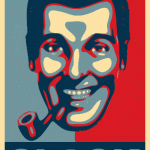I’ve been enjoying streaming Apple TV+’s Foundation based on Asimov’s classic books. The show is very different from the high-altitude narrative of the books and, frankly, I couldn’t see it being very engaging if it had been rendered the way the books were written. The central premise of predictability of vast civilizations via “psychohistory” always struck me as outlandish, even as a teen. From my limited understanding of actual history it seemed strange that anything that happened in the past fit anything but the roughest of patterns. I nevertheless still read all the “intellectual history” books that come out in the hope that there are underlying veins that explain the surface rocks strewn chaotically across the past. Cousin marriage bans leads to the rise of individualism? Geography is the key? People want to mimic one another? Economic inequality is the actual key?
Each case is built on some theoretical insight that is stabilized by a broad empirical scaffolding. Each sells some books and gets some play in TED and book reviews. But then they seem to pass away out of public awareness because the fad is over and there are always new ideas bubbling up. But maybe that’s because they can’t help us predict the future exactly (well, Piketty perhaps…see below). But what can?
The mysterious world of stocks and bonds is an area where there seems to be no end to speculation (figuratively and literally) about ways to game the system and make money, or even to understand macroeconomic trends. It’s not that economics doesn’t have some empirical powers, it’s just that it still doesn’t have the kind of reliability that we expect from the physical sciences.… Read the rest



